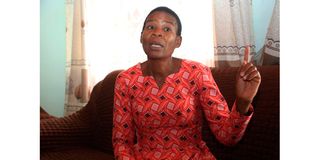Politics: Gusii counties still deep-rooted in patriarchy

What you need to know:
- Since independence, no woman has been elected to the National Assembly in either Kisii or Nyamira counties.
- In the just-concluded election, only one was elected MCA to sit in Kisii County Assembly.
- Local advocates say rigid cultural perceptions of women as inferior and disallowed to lead, make it difficult for women in theregion to break even in politics.
Women rights advocates in Kisii and Nyamira counties have called for concerted efforts to end deep-rooted patriarchy knocking women out of the political ring.
Since independence, no woman has been elected to the National Assembly in either county. In 2017, each county had only one woman elected to their respective county assemblies.
But only one was elected in the just concluded election. Beatrice Kerubo Makwae won Bombaba MCA on Orange Democratic Movement (ODM) party to sit in Kisii County Assembly.
Even ODM’s Rosa Kemunto Orondo who had in 2017 won Majoge Basi MCA seat in Kisii County, was not re-elected. Neither was Callen Kemuma Atuya who was the winner of Bokeira MCA seat in the last election when she ran on ODM. This year, she vied as an independent.
Of the nine sub-counties in Kisii County, only three women contested for parliamentary seats. None made it.
Ballot papers
Florence Bosibori Ayonga of National Ordinary People’s Empowerment Union was up against 15 men for Bobasi MP seat.
In Kitutu Chache North, Stella Bosibori Ouya was on the ballot on Usawa kwa Wote party. The same fate befell Cynthia Kerubu Toel who carried Jubilee party flag in Kitutu Chache South contest.
It was the same case in Nyamira County where two women featured on the MP ballot papers out of the four sub-counties. Janet Bochaberi Komenda was the only woman candidate for North Mugirango parliamentary competition among the 17 candidates. She was the Jubilee party candidate.
In Borabu, Josephine Kerubo Nyarera of Forum for Restoration of Democracy-Kenya unsuccessfully competed against 10 men.
The local advocates say rigid cultural perceptions of women as inferior and disallowed to lead, have made it difficult for women in the Gusii region to break even in politics.
“Here, patriarchy is on another level. Only God who will save us,” reckons Esnahs Nyaramba, founder of Young Women Democrats, which trains young politicians and roots for the inclusion of women in political leadership.
Principle of equality
She tells Nation.Africa that the Gusii nation condemns women out of leadership on the basis of their marital status, yet this goes against the principle of equality and non-discrimination outlined in the Constitution.
“Whenever a woman introduces herself, the next question is who your husband is? Where are you married? To the men, a woman is incomplete without a man."
“When women go out to campaign, they are asked to show their husbands. If they are not married, the men in the community will offer to find one to tame you because you're going astray. They say women cannot be the head and, therefore, cannot lead them,” she says.
But with the support of political parties and fellow women, the women can overcome these barriers, she says.
It would take a mind shift for women to make notable progress in active political participation in Kisii and Nyamira counties, observes InformAction Field Coordinator David Oseko.
He says women who seek elective seats are branded tough-headed and, therefore, on the communities’ traditional terms, they are disrespectful to men, which translates to an abomination.
“Even in the chief’s barazas, women sit far behind and they don’t contribute unless the chief insists that they do so,” he says.
“There is a serious problem here and it would take a multi-pronged approach to address it,” he notes.
He explains that: “If dominant churches here appoint women to leadership positions, they would be sending a message to its congregation and the community that women can indeed lead. Gradually, they will drop the stereotypes and begin to appreciate women as capable leaders.”





